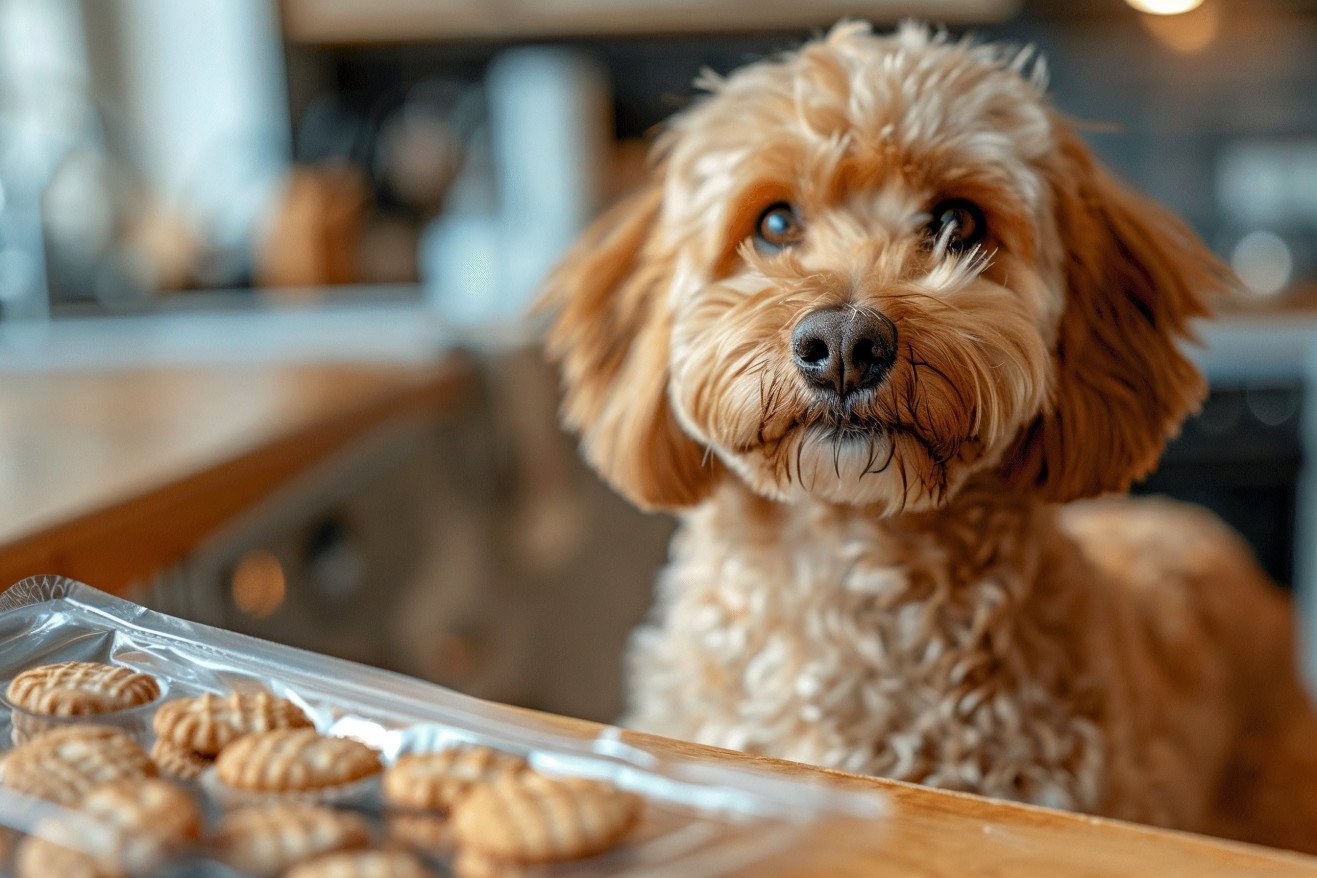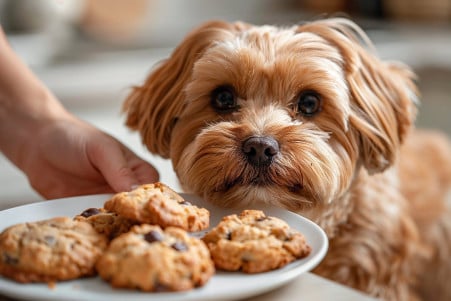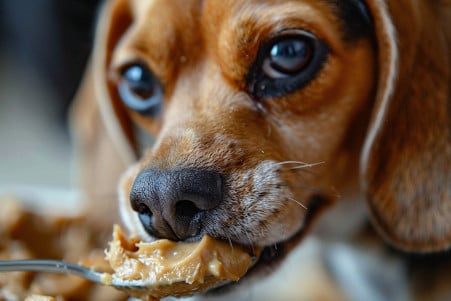Can Dogs Have Nutter Butters? The Dangers of Peanut Butter Cookie Consumption
18 May 2024 • Updated 17 May 2024

Peanut butter is generally safe for dogs to eat as an occasional treat, but the sugar, chocolate, and other ingredients found in popular peanut butter cookies like Nutter Butters can be problematic. Nutter Butters and other peanut butter cookies are not safe for dogs to eat. The sugar and chocolate in these cookies can be harmful to dogs and contribute to health problems like obesity, diabetes, and chocolate poisoning. While a small amount may not be harmful, it's best to avoid giving dogs cookies or other human snack foods altogether.
As we evaluate the evidence provided by veterinarians and pet nutrition research, it will be clear that while dogs can technically have small amounts of peanut butter cookies without negative health effects, these sweet treats are best kept away from dogs. We'll take a look at the dangers of Nutter Butters' ingredients and suggest healthier options that will allow your dog to enjoy peanut butter in a way that won't negatively impact their health in the long run.
Can dogs eat Nutter Butters?
Harmful Ingredients in Nutter Butters for Dogs
Nutter Butters contain a number of harmful ingredients that can negatively affect a dog's well-being. As reported by Animal Gator, they are high in sugar, which can lead to obesity, diabetes, and dental problems in dogs. The Environmental Working Group's analysis cited by Cuteness states that they also contain high levels of saturated fat and artificial trans fats, which can cause pancreatitis and other digestive issues.
Chocolate-covered Nutter Butters are even more dangerous because chocolate contains theobromine, a substance that is poisonous to dogs and can result in vomiting, diarrhea, and seizures if ingested in large amounts. Dogs with wheat or gluten allergies may also have negative reactions to the wheat flour in Nutter Butters, according to Animal Gator.
Although a small amount of natural peanut butter can be a healthy treat for dogs, the peanut butter in Nutter Butters is outweighed by the unhealthy ingredients like sugar and trans fats. With so many dangers, Nutter Butters are not a good choice to give to our dogs. There are healthier options that will allow dogs to enjoy the taste of peanut butter without the negative side effects.
Healthier Peanut Butter Treats for Dogs
Unsweetened, natural peanut butter with no added oils, sugars, or salt can be a good treat for dogs in moderation, per It Doesn't Taste Like Chicken. Homemade peanut butter dog treats with simple, dog-safe ingredients like oats, bananas, or pumpkin puree are a nutritious option to store-bought treats, as shown in recipes from The Cookie Rookie and Eating Bird Food.
If you're shopping for store-bought peanut butter dog treats, Furtropolis suggests finding ones with natural ingredients and no artificial sweeteners like xylitol, which is poisonous to dogs. Other nut butters, including cashew, hazelnut, and almond butter, can be safe for dogs if they are unsweetened and don't include any harmful additives, according to Dog Child. However, always make sure to read the label and avoid nut butters or treats with macadamia nuts, which are toxic to dogs.
Safe Peanut Butter Serving Sizes and Dangers of Overconsumption for Dogs
Peanut butter is high in calories and fat, so it should be fed to dogs in moderation. PetMD recommends no more than 1/2 teaspoon for small dogs and 1 teaspoon for medium and large dogs, up to twice a day. PetHonesty also warns that overconsumption of peanut butter can lead to obesity, pancreatitis, and other health problems in dogs.
Although peanut butter allergies are rare, Blue Cross says that some dogs may experience an upset stomach or other symptoms of an allergic reaction. However, the biggest danger is peanut butter that contains the artificial sweetener xylitol, which is highly poisonous to dogs and should be kept away from them at all costs, according to The Farmer's Dog.
Dangers of Giving Dogs Peanut Butter Cookies and Other Baked Goods
Peanut butter cookies and other baked goods that contain peanut butter are not recommended for dogs due to their high sugar and fat content, according to Pets Best. If a dog eats a peanut butter cookie or cracker that was made for human consumption, it's important to read the label to see if it contains any ingredients that are toxic to dogs, such as xylitol, which can be very harmful.
While Dogster says that a dog is unlikely to have any serious side effects from eating a small amount of human peanut butter baked goods, unless they eat a large quantity, it's still a good idea to call your vet if your dog has eaten a lot of peanut butter baked goods, especially if they contain chocolate or xylitol, according to BeChewy.
To be on the safe side, as the National Peanut Board suggests, it's best to avoid giving dogs any human peanut butter baked goods and stick to peanut butter treats that are made for dogs so you can make sure your pup can enjoy peanut butter without any risk to their health.
Peanut Butter Dog Treats You Can Make at Home
If you want to make sure that you know exactly what your dog is eating, you can make your own peanut butter dog treats at home, says It Doesn't Taste Like Chicken. Many homemade peanut butter dog treat recipes call for natural peanut butter, whole wheat flour, eggs, and other healthy ingredients like bananas or pumpkin puree, which are used in recipes from The Cookie Rookie and Damn Delicious.
If you make your own peanut butter dog treats, Lord Jameson says that you should always use natural peanut butter that doesn't contain added sugars, salts, or artificial sweeteners like xylitol. If your dog is sensitive to wheat or gluten, you can also use alternative flours like rice, sorghum, oat, or garbanzo bean flour, according to Love From The Oven and Flying on Jess Fuel. You can keep homemade peanut butter dog treats at room temperature, in the refrigerator, or freeze them for longer shelf life.
Conclusion: How to Safely Feed Your Dog Peanut Butter
While Nutter Butters and other peanut butter cookies are not good for dogs because of their high sugar, fat, and potential toxin content, there are ways to safely feed your dog peanut butter. Dogs can eat natural, unsweetened peanut butter in moderation, but you should follow portion recommendations based on your dog's size and weight.
Homemade peanut butter dog treats that are made with simple, dog-safe ingredients are a better option than store-bought treats because you can control what goes into them. If you do buy peanut butter dog treats, make sure to read the label and avoid any that contain artificial sweeteners like xylitol, which is poisonous to dogs. With a little care in choosing products and measuring out portions, dog owners can safely give their pets peanut butter as an occasional treat.


